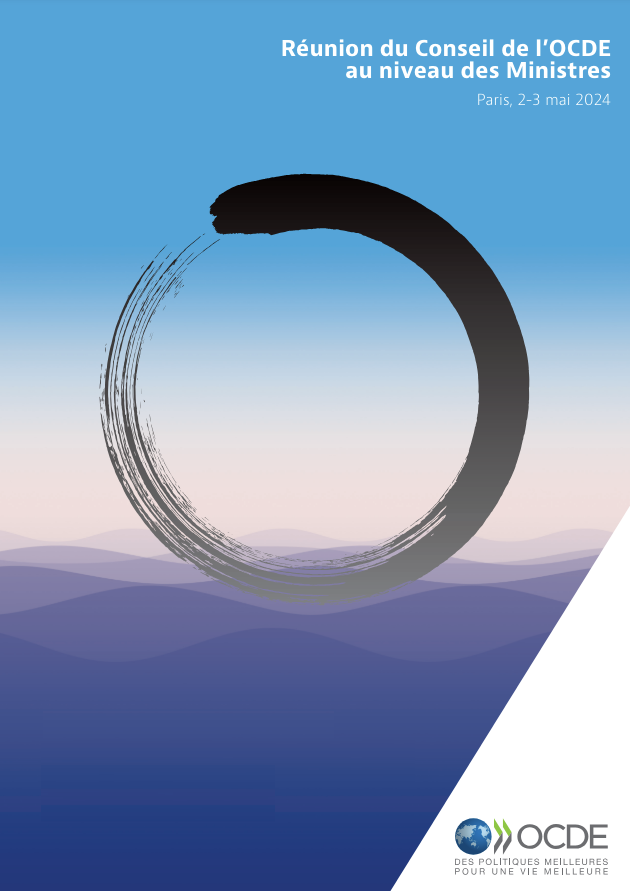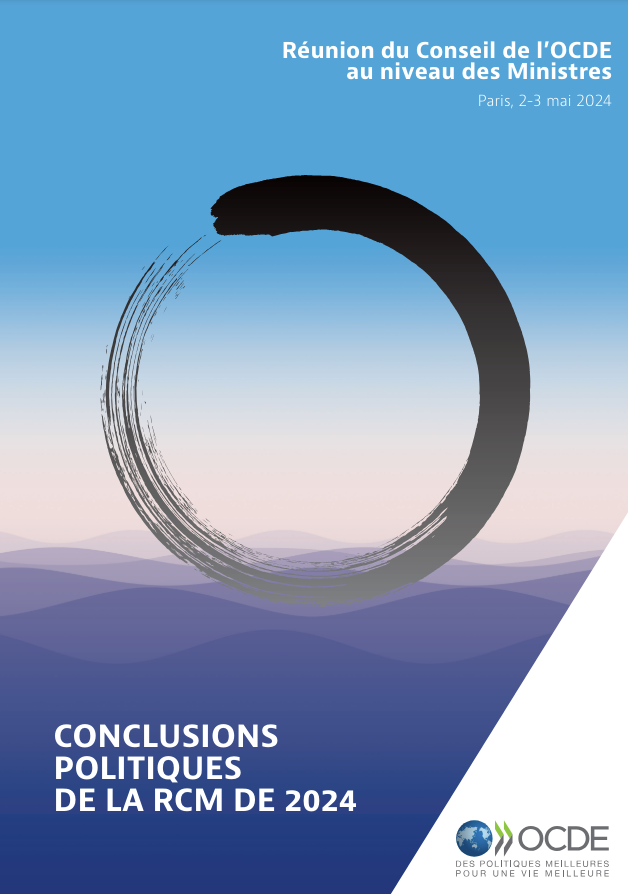Remarks by Mathias Cormann,
Secretary-General, OECD
OECD, 5 October 2021
Secretary Blinken, Ministers, Ambassadors,
A warm welcome to the second part of the OECD’s 2021 MCM in our Organisation’s 60th anniversary year.
We’re delighted to be joined by US Secretary of State Tony Blinken, who will be chairing this Ministerial, supported by our Vice-Chairs – the Foreign Minister of Korea, Chung Eui-yong and the Finance Minister of Luxembourg, Pierre Gramegna.
Née du plan ambitieux de George Marshall, la mission de l’OCDE s’inscrit dans le cadre d’un effort plus large visant à ancrer un ordre international fondé sur des règles et la coopération multilatérale, afin de promouvoir le développement économique mondial et d'améliorer le bien-être des populations partout dans le monde.
Alors que nous célébrons notre Soixantième anniversaire, il est important de réaffirmer les « valeurs communes » inscrites dans la Convention fondatrice de notre Organisation et réitérées dans notre Vision, renouvelée.
This MCM comes at a particularly important moment in time for the world, with clear opportunities for the OECD to help contribute solutions to some of the key global challenges we are facing.
- Optimising the strength and the quality of our recovery.
- Driving and supporting global leadership on more ambitious, effective, and globally coordinated action on climate change.
- Seizing the opportunities of the accelerating digital transformation while better managing some of the associated and growing risks, challenges and disruptions.
- Finalising a multilaterally agreed approach to international taxation, making international tax arrangements fairer and work better in the context of digitalisation and globalisation.
- Advancing gender equality;
- As market-based democratic trading nations, actively supporting the crucial work of the WTO – to help ensure we can have a well-functioning, open global market underpinned by a rules based multilateral trading system in good working order.
- Strengthening our global engagement and promoting OECD values, principles and standards – in particular towards the Asia-Pacific and Africa.
The pandemic has wreaked havoc on the world economy, hitting the livelihoods of people everywhere.
But the economic recovery is underway. Economic growth continues to pick up and the economic outlook continues to improve.
We have been consistently upgrading our projections for GDP ever since the middle of 2020, with global economic growth now expected to reach 5.7% this year and 4.5% in 2022.
Extensive policy support, combined with the unexpectedly rapid development of effective vaccines, combined with the accelerating digital transformation of our economies - all contributed to this more optimistic outlook.
Yet the recovery remains uneven across countries and sectors.
New outbreaks of the virus remain our biggest risk.
We need to continue to pursue an all-out effort to reach the entire world population with vaccines as quickly as possible.
No country will be protected until everyone is protected.
First, to optimise the strength and the quality of the recovery:
- Policy support should remain flexible, adjusted to the evolving health and economic situation.
- The composition of that support must be better targeted to those in genuine need and towards future focused investment, particularly into our green and digital transitions and our infrastructure.
- Open markets, a strong competitive framework, a system which rewards the most productive and innovative business ideas and encourages investment in future growth and success will lead to quality job creation and the lifting of living standards.
- All OECD members, in fact all trading nations, have an interest in strengthening the rules-based multilateral trading system, with the WTO at its centre.
- Recovery policies must promote equality of opportunities and foster social mobility, including restoring and boosting opportunities for women and youth, those with low skills, those caring for children or the elderly, and those who are sick.
- Our new Policy Framework for Gender-Sensitive Public Governance provides the critical evidence base to mainstream gender in our policy work and improve the gender balance in public decision-making.
- We are also launching the new OECD Dashboard to guide and monitor a Strong, Resilient, Inclusive and Green Recovery.
Second, and as importantly, the OECD will help drive and support more ambitious, effective and globally coordinated action on climate change.
We are working to help turn increased political ambition into outcomes on our pathway to global net-zero emissions by 2050.
A key pillar of our collective response is access to better data on comparative policy effort and impact.
Since we last met earlier this year our team has worked hard to start operationalising the OECD’s International Programme for Action on Climate (IPAC) as part of our contribution to global efforts to achieve global net zero by 2050.
IPAC’s preliminary Dashboard of key indicators is the first tangible outcome of that effort, which we are pleased to deliver at this MCM.
It contains clear, comparable indicators on progress towards climate goals.
We are also presenting a progress report on IPAC’s Climate Action Monitor at COP26 next month as a key OECD deliverable.
In addition, I have also recently proposed a new initiative to help facilitate a more ambitious, but also internationally more coherent, better coordinated approach to the pricing of emissions.
I have proposed to develop an Inclusive Framework type approach, similar to the one used to make our international tax system fairer and work better.
The aim is to help ensure more ambitious action on climate change in a way that is both globally effective and fair. Effective in that it helps reduce global emissions instead of shifting emissions from one area to other parts of the world. And fair in that every country carries a fair share of the burden.
How best to preserve a global level playing field, while lifting ambition and effort on climate to the level required through an appropriately comprehensive, coherent global approach – while minimising competitiveness implications, carbon leakage and trade tensions.
That’s the challenge.
The proposal is to assess and report on explicit and implicit carbon pricing efforts around the world as a way to inform such a more coherent globally coordinated way forward.
Third, we will support efforts to seize the opportunities while better managing the risks and challenges associated with the digital transformation of our economies.
This includes ensuring appropriate and equitable access to digital infrastructure, investing in skills development, planning for the future of work, effectively addressing competition issues, cyber security, privacy, cross border data free flow with trust, tax policy implications, as well as setting values-based standards, for example, on the use of Artificial Intelligence.
Fourth, we are committed to finalising reforms of our international taxation arrangements through a multilateral approach to ensure they are effective and fair.
All this work, OECD standards and state of the art analysis, contribute to support global fora – the G7, the G20, APEC and others.
Finally, we will continue to broaden our global engagement, by strengthening the OECD’s outreach in the Asia-Pacific region, as well as Africa, while keeping the momentum going in our engagement with other regions, from Latin America to South Eastern Europe.
This MCM will give us many of the tools we need to succeed in this goal.
Specifically, the 60th Anniversary Vision Statement reaffirms the importance of our shared values and principles, and charts the course for the future of the OECD and the world we would like to build with our Members and Partners.
The new OECD Global Relations Strategy will guide our external engagements, promoting adherence to OECD standards and practices.
In the pursuit of a more level global playing field, it is in the interests of OECD members to have more countries commit as fulsomely as possible to our OECD standards.
We continue to encourage and promote the adoption of our standards by non-member countries. But OECD membership is ultimately the most direct and effective way for us to ensure the most comprehensive application of our shared values, principles and standards in those jurisdictions.
Accession to the OECD has been positively transformative for those who have joined over past decades and it has increased our global reach and impact to the benefit of our collective membership.
Any market based democracy submitting a genuine expression of interest to join the OECD, while demonstrating a genuine commitment to pursue the necessary reforms to comply with all of the requirements of OECD membership, should have the opportunity to make its case.
Six countries – in alphabetical order – Argentina, Brazil, Bulgaria, Croatia, Peru and Rumania have repeatedly expressed their strong commitment to joining the OECD as members.
They have all demonstrated clear progress in adopting OECD standards and participating in OECD bodies, consistent with the provisions of the Framework for future Membership endorsed by Ministers at the 2017 MCM.
They are all showing a commitment and a readiness to increase their compliance with our standards and policies.
And they have all been waiting for an answer for several years.
We need to resolve their applications.
It goes to our credibility.
We had a very good, very productive informal discussion at a Heads of Delegations meeting recently, which I believe provides a good basis for a way forward.
In the weeks following this MCM I will work with members to find a way forward to ensure the six applicant countries can have their applications assessed through an appropriate technical assessment process.
Ministers,
For the past 60 years, the OECD has enriched policymaking across the world.
As the global economy is emerging from the crisis, it is time to write the next chapter together.
And let us honour those who wrote the history of their time.
As we ask Secretary Blinken to launch this Ministerial Council meeting on the 60th anniversary of our organization, let us celebrate his distinguished predecessor, George C. Marshall.
It was he, who through the Marshall Plan, ingeniously linked US aid towards the reconstruction of post-war Western Europe to a requirement for Europe’s democracies to work together and cooperate.
The model was so successful that from 1961 onwards it was progressively expanded to market-based democracies around the world – with more wanting to join.
It was that enlightened diplomacy after World War II, which laid the foundation for peace, stability and prosperity across Europe and the Western world.
As part of our celebration of that statesmanship you will receive a copy of George Marshall’s speech delivered at Harvard University back in June 1947 and translated into your own languages.
I would recommend a quick visit to the exhibit we have put together about the Marshall Plan and the foundation it laid for the creation of the OECD.
It is a reminder of how far we have come and how much more we can achieve together through cooperation and compromise on the foundation of our shared values.
Please let me now pass the floor to the Chair of this 2021 MCM.
Secretary Blinken the floor is yours.
Thank you.
Also AvailableEgalement disponible(s)

